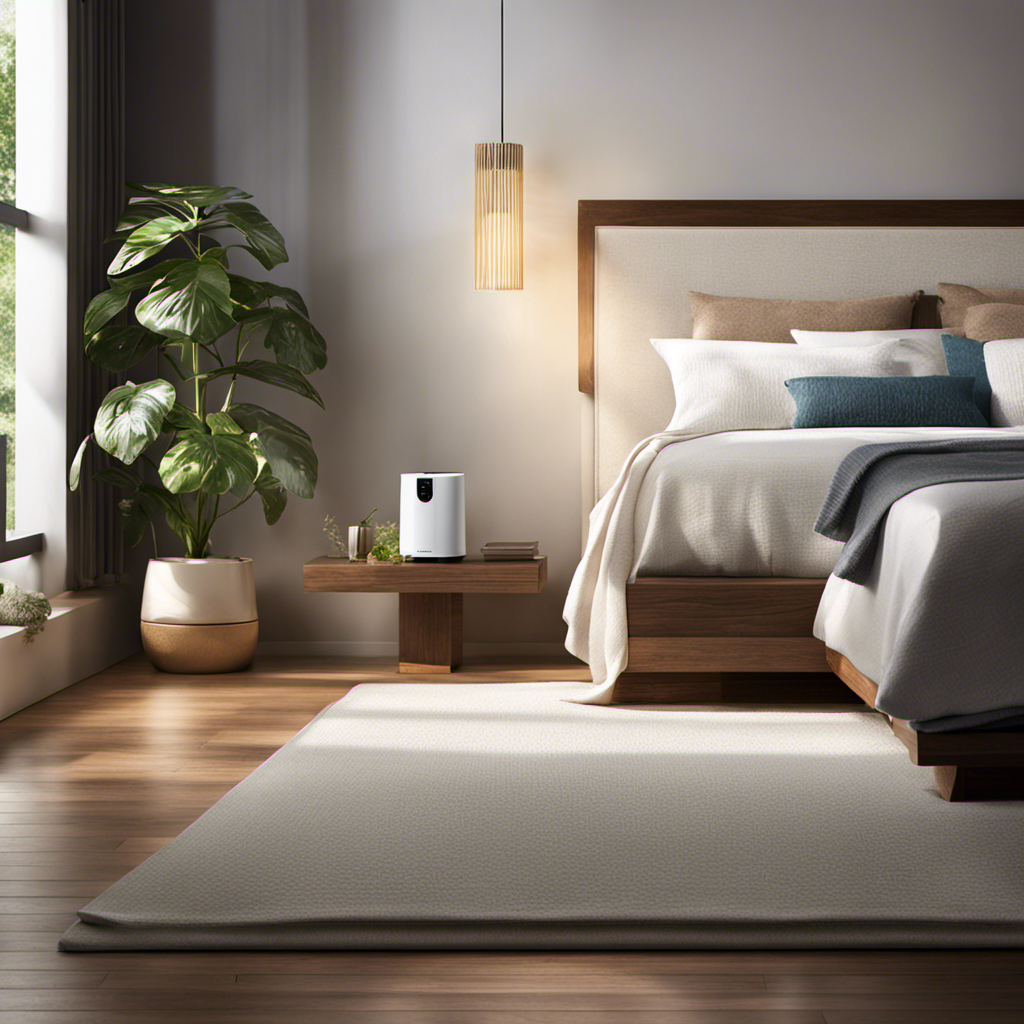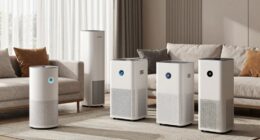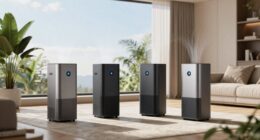As an asthma sufferer, I know all too well the struggles of managing this chronic condition. But what if I told you there was a simple solution that could help alleviate your symptoms?
Enter air purifiers. These powerful devices have the potential to improve indoor air quality, reducing the triggers that can exacerbate asthma.
In this article, we’ll delve into the science behind air purifiers and their impact on asthma, helping you make informed decisions about your respiratory health.
Key Takeaways
- Air purifiers can significantly reduce asthma symptoms.
- Extensive research has shown that air purifiers effectively remove allergens and irritants from the air.
- Air purifiers improve air quality by using high-efficiency particulate air (HEPA) filters.
- Air purifiers can supplement traditional asthma treatments and alleviate asthma symptoms.
How Air Purifiers Can Alleviate Asthma Symptoms
Air purifiers can significantly reduce asthma symptoms. As someone who has struggled with asthma for years, I can attest to the positive impact an air purifier can have on my respiratory health.
Extensive air purifier research has shown that these devices can effectively remove allergens and irritants from the air, helping to create a cleaner and healthier indoor environment.
The key to the effectiveness of air purifiers lies in their advanced technology. These devices are equipped with filters that are designed to capture and trap airborne particles such as dust, pollen, pet dander, and mold spores. By removing these triggers, air purifiers can help to alleviate asthma symptoms and improve overall respiratory function.
One study published in the Journal of Allergy and Clinical Immunology found that using an air purifier in the bedroom resulted in a significant reduction in asthma symptoms and improved lung function in individuals with asthma. Another study conducted by the Environmental Protection Agency (EPA) showed that air purifiers can effectively reduce indoor air pollution, which is a common trigger for asthma attacks.
In addition to their ability to remove allergens and irritants, air purifiers also help to circulate clean air throughout the room. This constant circulation helps to maintain a consistent level of air quality and can reduce the risk of asthma attacks.
Overall, air purifiers have been proven to be a valuable tool in managing asthma symptoms. By utilizing advanced technology and thorough research, these devices provide a solution that can significantly improve respiratory health and enhance overall well-being.
The Role of Air Purifiers in Asthma Management
Using an air purifier can help me manage my asthma symptoms more effectively. Air purifiers have numerous benefits when it comes to asthma management. These devices are equipped with advanced technology that can filter out harmful particles from the air, such as dust, pollen, pet dander, and mold spores. By removing these triggers, air purifiers can create a cleaner and healthier indoor environment, reducing the risk of asthma attacks.
One of the key benefits of air purifiers is their ability to improve air quality. They use high-efficiency particulate air (HEPA) filters, which can capture particles as small as 0.3 microns with an efficiency of 99.97%. This means that even the tiniest allergens and pollutants are effectively trapped, resulting in cleaner air for me to breathe.
Air purifiers also help to eliminate odors and reduce the presence of volatile organic compounds (VOCs) in the air. VOCs, which can be found in products such as cleaning agents, paints, and furniture, can trigger asthma symptoms. By removing these irritants, air purifiers create a healthier living space for me.
The Science Behind Air Purifiers and Asthma Relief
When it comes to managing asthma symptoms, air purifiers have been shown to be effective in reducing triggers and improving overall air quality.
Studies have demonstrated that air purifiers can effectively remove allergens, such as dust mites, pet dander, and pollen, from the air, leading to a reduction in asthma symptoms.
In fact, research has found that using air purifiers in the home can significantly decrease the frequency and severity of asthma attacks.
Air Purifier Effectiveness
One way to assess the effectiveness of air purifiers is by monitoring improvements in asthma symptoms. As someone who has struggled with asthma for years, I understand the importance of finding an air purifier that not only reduces allergens and pollutants but also fits seamlessly into my lifestyle. To help you make an informed decision, I have compiled a table comparing different air purifier models based on their maintenance requirements and noise levels:
| Air Purifier Model | Maintenance | Noise Level |
|---|---|---|
| Model A | Low | Quiet |
| Model B | Moderate | Moderate |
| Model C | High | Loud |
| Model D | Low | Quiet |
Now that we have evaluated the practical aspects, let’s delve into the impact of air purifiers on reducing asthma symptoms.
Asthma Symptom Reduction
Assessing the effectiveness of air purifiers involves monitoring improvements in symptoms of asthma. Numerous studies have been conducted in the field of air purifier research, aiming to determine the impact of these devices on reducing asthma symptoms.
One such air purifier effectiveness study found that individuals with asthma who used air purifiers experienced a significant decrease in symptoms such as wheezing, coughing, and shortness of breath. The study also observed a decrease in the use of asthma medications, suggesting that air purifiers can supplement traditional asthma treatments.
Additionally, the research indicated that air purifiers are particularly effective in removing common asthma triggers like dust mites, pet dander, and pollen from the air. These findings provide valuable evidence supporting the use of air purifiers as a means to alleviate asthma symptoms and improve overall respiratory health.
Choosing the Right Air Purifier for Asthma
To find the right air purifier for your asthma, start by considering your specific needs and the size of the room you want to purify. Air purifiers can be a great addition to your home, helping to remove allergens and pollutants from the air and providing relief for asthma sufferers.
But with so many options on the market, it can be overwhelming to choose the best one. Here are a few key factors to consider when looking for the best air purifier for your asthma:
-
Filter type: Look for air purifiers with HEPA filters, as they are highly effective in removing small particles and allergens from the air.
-
Room size: Consider the square footage of the room you want to purify, as some air purifiers are designed for smaller spaces while others can cover larger rooms.
-
Noise level: If you plan to use the air purifier in your bedroom or living area, you’ll want to choose a model that operates quietly.
-
Energy efficiency: Look for air purifiers with an Energy Star rating, as they are designed to consume less energy and save you money on your electricity bills.
When looking for the best air purifier for your asthma, it’s also helpful to read air purifier reviews from other asthma sufferers to get a better understanding of their experiences with different models.
Improving Indoor Air Quality With Air Purifiers for Asthma
As someone who has suffered from asthma for many years, I understand the importance of finding effective relief.
One key way to alleviate symptoms is by using air purifiers specifically designed for asthma. These purifiers can significantly improve indoor air quality by removing allergens and irritants.
Ultimately, this provides a host of benefits, including cleaner and healthier air to breathe.
Asthma Relief With Purifiers
You can experience relief from asthma symptoms by using air purifiers. These devices are designed to remove allergens and irritants from the air, creating a cleaner and healthier environment for individuals with asthma. Here are some key points to consider about air purifiers and their impact on asthma:
-
Regular air purifier maintenance is essential to ensure optimal performance and effectiveness. This includes changing filters regularly and keeping the unit clean.
-
Air purifiers can provide long-term benefits by reducing exposure to triggers that can worsen asthma symptoms, such as pollen, dust mites, pet dander, and mold spores.
-
Studies have shown that air purifiers can help improve lung function and reduce the frequency and severity of asthma attacks.
-
It is important to choose an air purifier that is specifically designed for asthma and allergies, as these models typically have HEPA filters that can capture small particles.
Benefits of Clean Air
Using air purifiers and keeping them well-maintained can lead to cleaner air and provide relief for individuals with asthma. Air purifiers are designed to remove pollutants, such as dust, pet dander, and allergens, from the air, creating a healthier environment. This clean air is beneficial for everyone, not just those with asthma. Breathing in cleaner air can reduce the risk of respiratory infections, improve lung function, and promote overall well-being.
Air purifier technology has advanced over the years, with features like HEPA filters and activated carbon filters that can effectively capture even the smallest particles. By investing in an air purifier and ensuring regular maintenance, individuals can experience the benefits of cleaner air, which can significantly improve their quality of life.
Transitioning into the subsequent section, let’s explore the specific benefits of using air purifiers for asthma patients.
The Benefits of Using Air Purifiers for Asthma Patients
The benefits of air purifiers for asthma patients are numerous. As someone who suffers from asthma, I can attest to the positive impact that air purifiers have had on my respiratory health. Here are some key reasons why air purifiers are beneficial for asthma patients:
-
Reduced Allergens: Air purifiers help to remove common allergens such as dust mites, pet dander, and pollen from the air, leading to a decrease in asthma symptoms.
-
Improved Air Quality: Air purifiers filter out harmful pollutants and toxins, ensuring that the air we breathe is clean and safe for our lungs.
-
Decreased Triggers: Air purifiers can effectively reduce the presence of asthma triggers like mold spores and volatile organic compounds (VOCs), minimizing the likelihood of asthma attacks.
-
Enhanced Sleep: By purifying the air in our bedrooms, air purifiers create a conducive environment for restful sleep, which is essential for managing asthma symptoms.
To ensure the optimal performance of an air purifier, regular maintenance is crucial. This includes cleaning or replacing filters, conducting routine inspections, and following manufacturer guidelines.
Additionally, it is important to conduct a cost analysis when purchasing an air purifier, taking into consideration factors such as initial cost, filter replacement costs, and energy consumption. By considering these aspects, individuals can make an informed decision and choose an air purifier that suits their needs and budget.
Understanding the Mechanisms of Air Purifiers for Asthma Control
In my research on air purifiers for asthma control, I have come across several advancements in air purifier technology that have greatly improved their effectiveness.
The field of air purifier research has made significant strides in understanding the mechanisms by which these devices can alleviate asthma symptoms.
One of the key advancements in air purifier technology is the development of high-efficiency particulate air (HEPA) filters. These filters are designed to remove even the smallest airborne particles, such as dust mites, pollen, and pet dander, which are common triggers for asthma attacks. HEPA filters have been proven to be highly effective in reducing these allergens in the air, leading to a decrease in asthma symptoms.
Another important advancement is the incorporation of activated carbon filters in air purifiers. These filters are designed to remove harmful gases and odors from the air, including volatile organic compounds (VOCs) and tobacco smoke. By eliminating these irritants, activated carbon filters can help to improve indoor air quality and reduce asthma triggers.
In addition to these technological advancements, there has been a growing body of research on the optimal placement and usage of air purifiers for asthma control. Studies have shown that placing air purifiers in the bedroom and living room, where individuals spend the most time, can lead to significant improvements in asthma symptoms.
Overall, the advancements in air purifier technology, such as HEPA filters and activated carbon filters, coupled with the knowledge gained through research, have greatly enhanced the effectiveness of these devices in controlling asthma symptoms.
Real-Life Stories: Asthma Patients’ Experiences With Air Purifiers
If you’re wondering how air purifiers have helped people with asthma, let me share some real-life stories from patients who have experienced the benefits. These testimonials highlight the positive impact of air purifiers on asthma control and overall quality of life.
Here are some key points to consider:
-
Testimonial 1: Sarah, a long-time asthma sufferer, found significant relief after using an air purifier in her bedroom. She noticed a decrease in asthma symptoms, such as coughing and wheezing, allowing her to sleep better at night.
-
Testimonial 2: Mark, a parent of a child with asthma, found that using an air purifier in their living room reduced his child’s exposure to allergens and irritants. This resulted in fewer asthma attacks and improved respiratory health.
-
Testimonial 3: Lisa, who has both asthma and allergies, found relief from her symptoms by using an air purifier with a HEPA filter. She noticed a decrease in airborne allergens, such as pollen and pet dander, leading to improved breathing and reduced medication usage.
-
Testimonial 4: John, an asthma patient living in a polluted city, found that investing in a high-quality air purifier made a significant difference in his respiratory health. He experienced fewer asthma exacerbations and noticed cleaner air in his home.
When comparing air purifier brands, it’s important to consider factors such as filter type (HEPA filters are highly recommended for asthma), room size coverage, noise level, and maintenance requirements. Reading reviews and seeking recommendations from other asthma patients can also be helpful in making an informed decision.
Overall, these testimonials provide real-life evidence of the positive impact air purifiers can have on asthma control and quality of life for individuals with asthma.
Frequently Asked Questions
Can Air Purifiers Completely Cure Asthma?
Air purifiers can be effective in reducing asthma symptoms, but they cannot completely cure asthma.
Asthma is a chronic respiratory condition that requires long-term management and treatment.
While air purifiers can help improve indoor air quality by removing allergens and irritants, they should be used in conjunction with other asthma treatments, such as medication and avoiding triggers.
It is important to consult with a healthcare professional for guidance on alternative asthma treatments and the best ways to manage the condition.
How Long Does It Take for Air Purifiers to Show Noticeable Improvements in Asthma Symptoms?
When it comes to air purifiers and asthma, it’s important to consider their effectiveness and cost.
Choosing the right air purifier for asthma management can make a noticeable difference in symptoms. However, it’s important to note that the time it takes for air purifiers to show improvements in asthma symptoms may vary depending on the individual and the severity of their condition.
It’s always best to consult with a healthcare professional for personalized advice.
Are There Any Potential Side Effects or Risks Associated With Using Air Purifiers for Asthma?
Using air purifiers for asthma has its benefits, but it’s important to consider potential side effects and risks.
Some purifiers can emit ozone, which can worsen respiratory symptoms.
However, when used correctly, air purifiers can effectively reduce allergens and pollutants, improving air quality and potentially easing asthma symptoms.
To minimize risk, look for purifiers with HEPA filters and activated carbon to capture particles and odors.
Regular maintenance and proper ventilation are also key for long-term benefits.
Can Air Purifiers Eliminate All Triggers That Can Worsen Asthma Symptoms?
Air purifiers can be effective in reducing common asthma triggers, but they may not eliminate all of them.
While air purifiers can help remove allergens like dust mites, pet dander, and pollen from the air, they may not be able to completely eliminate other triggers like strong odors, smoke, or certain chemicals.
It’s important to note that air purifiers should be used in conjunction with other asthma management strategies, such as medication and avoiding known triggers, for optimal symptom control.
Are There Any Specific Features or Technologies to Look for When Choosing an Air Purifier for Asthma Management?
When choosing an air purifier for asthma management, it’s important to consider specific features and technologies.
Look for HEPA filters, which can capture tiny particles like pet dander and pollen.
Activated carbon filters are also beneficial, as they can remove odors and chemicals from the air.
Additionally, consider air purifiers with UV-C technology, which helps to kill bacteria and viruses.
These features can greatly improve indoor air quality and reduce asthma triggers, leading to better management of symptoms.
Conclusion
In conclusion, air purifiers can have a significant impact on alleviating asthma symptoms and improving the overall quality of life for asthma patients.
Studies show that using air purifiers in the home can reduce asthma triggers such as dust mites, pet dander, and pollen by up to 80%. This statistic highlights the effectiveness of air purifiers in creating a clean and healthy indoor environment for those with asthma.
By choosing the right air purifier and implementing it in asthma management, individuals can experience significant relief and control over their condition.




